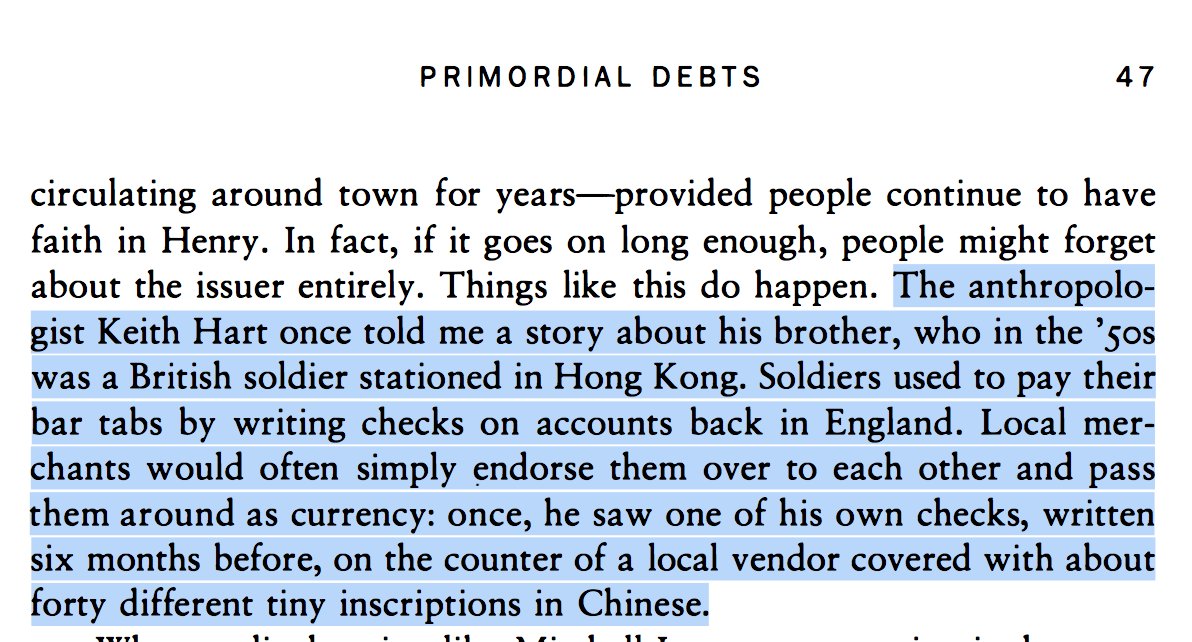I’ve been chipping away at a web of trust microlending concept for a while and last night I finally simplified it to the point where it seems stupid and obvious and can’t get much simpler.
I don’t want to just drop it yet because I want to clearly describe the implications first, otherwise it could easily seem uninteresting.
Doesn’t require an ICO, no central person benefits, no guaranteed returns for anyone, but lets intimate trusting communities create financial liquidity on their own terms.
Allows for n-layer transitive trust, allowing for potentially huge community leverage when trust is strong.
Composable from small, individually deployed smart contracts with lots of participant autonomy. No central point of failure, just a pattern for extending trust.
The concept is: p2p fractional reserve banking. Fill a smart contract with digital assets, give out tokens backed by those. Anyone can redeem instantly, but if they don’t, liquidity is created. Hence, web of TRUST.
I have a lot of instincts that say “that’s stupid, it’s so simple”, but I also have a growing number of reasons to think it might just work.
This passage from @davidgraeber’s “Debt” has been somewhat haunting me, driving some of the suspicions driving this concept.
Bancor is definitely thinking about some of the same mechanics from a different perspective, it& #39;s great!
I agree maybe too much with Bancor here. Even this small piece is worthy of such serious consideration, but almost instantly it& #39;s layered with so much more! Tradeability, hard-coded issuance rules, that is not how I issue trust.
Since Bancor and Curved Token models both have similar concepts of “backing tokens w/ others”, this probably deserves its own protocol, separating issuance/buyback policy.
Coming from a web of trust angle, my top priority is reserving a person’s right to revoke extended trust, which would mean the ability to burn people’s tokens. Good luck trading those on polo.
While automated issuance algorithms can allow tradable token-backed-tokens, a web of trust by necessity has to be a more intimately issued thing. You don’t want strangers holding leverage over your accounts.
Plus, blind “bundles of assets” is exactly the kind of reckless hedging that caused the financial crisis. I’m talking about enabling personal, informed lending to normal people.
It even works for stupid trivial things, like splitting expenses for a vacation. Members can permit each other a certain discretionary budget, and re-up as needed.
Someone deleted a tweet asking if this is similar to WeTrust.
Their TLCs are a smart contract for a loan with terms. It& #39;s simply a more opinionated, specific type of loan contract. I don& #39;t think they compete or necessarily combine, just meet diff needs.
Their TLCs are a smart contract for a loan with terms. It& #39;s simply a more opinionated, specific type of loan contract. I don& #39;t think they compete or necessarily combine, just meet diff needs.
Okay, I need to go to sleep, but sharing these thoughts has resulted in so much valuable feedback, that I am now sharing my raw, unedited notes that led to this, for the intrepid: https://medium.com/@danfinlay/draft-peer-to-peer-web-of-trust-84c1a97f36c1">https://medium.com/@danfinla...

 Read on Twitter
Read on Twitter



